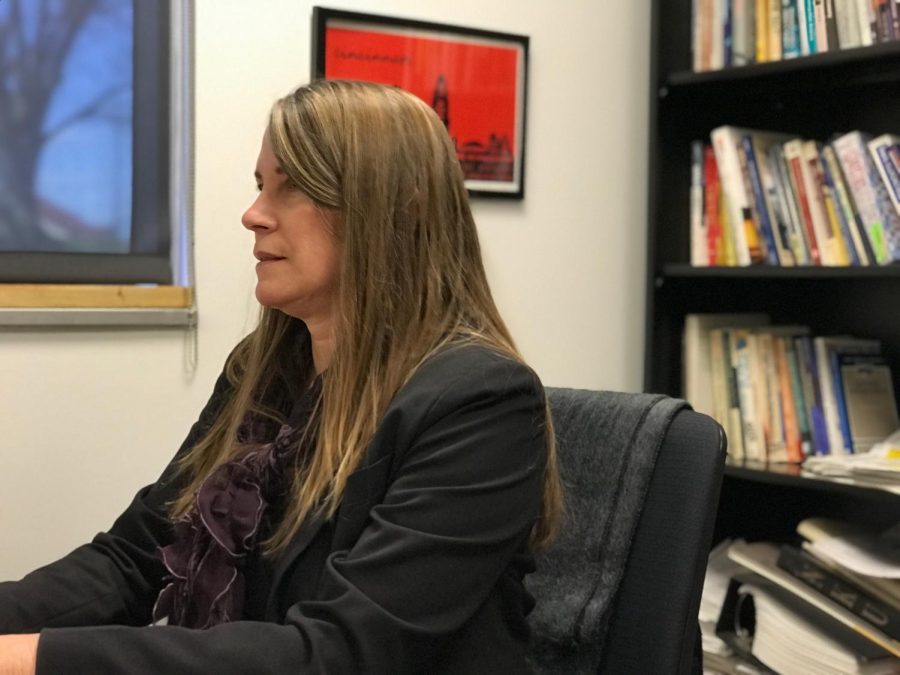Your donation will support the student journalists of Northern Kentucky University. Your contribution will allow us to purchase equipment and cover our annual website hosting costs.
NKU’s move to grab the graduate market
NKU offers 'bite-sized' courses to those unsure about the graduate program
December 8, 2017
Dr. Julie Olberding, director of the master of public administration program, thinks micro-credentials will help those who don’t have time or money to commit to a master’s program
Starting in the spring of 2018, NKU will become the first university in the Greater Cincinnati area to adopt a micro-credential or “badge” program.
“We hope to be able to attract professionals that don’t have time or don’t want to commit for a longer time of study,” said Dr. Traian Truta, professor of computer science and program director of the master of science in computer information technology (CIT).
These programs are currently broken down into five categories: Leadership, Health or Counseling, Information Technology, Communication and Education. Each of these categories is broken down further into programs like Cybersecurity, Disaster Readiness, Navigating the Diverse Workplace and Fundamentals of Mindfulness.
Every program is made of a set of existing classes that complement that specific area of study—for example—the Cybersecurity program is comprised of CIT 530, Computer Forensics and CIT 580, Securing Computer Systems. Once a student finishes the specific micro-credential program they are awarded a “badge” that can be displayed through websites like LinkedIn. This is all thanks to a company called Credly, which is a secure platform for earning, distributing and displaying digital micro-credentials via www.credly.com.
While some of these programs focus on hard skills, such as Cybersecurity, others focus on soft skills, like Navigating the Diverse Workplace or Fundamentals of Mindfulness. The difference between these skill types is arguable, but hard skills should be easily measured while soft skills might be a bit more difficult to track.
“They have these competencies, they have this knowledge and skills. It’s something that students can communicate to potential employers, things that they can do, things that they’ve learned,” said Dr. Julie Olberding, director of the master of public administration program.
Dr. Rudy Garns, interim director of integrative studies, believes the way these “badges” are packaged can show employers that their employee has made some progress in an area of interest. Plus, the digestible nature of these truncated programs offers anyone with an undergraduate degree the chance to enroll—if someone has the time and money, they are just as eligible as the next person.
“I think it’s a smart move. I think it doesn’t really cost the university anything, a little bit for Credly, but these are courses we’re going to be offering anyway,” said Garns on the wide selection of classes offered. “Why not make them available to a whole group of potential students who wouldn’t otherwise be thinking about this?”
Garns, Trufta and Olberding all spoke on how this micro-credential program could serve as a gateway to certificate or master’s programs. The classes that create each micro-credential still award credit hours, and those can add up.
“The hope is that they’ll get a micro-credential. Hopefully, from there, they may get their dream job or the job that they had wanted,” Olberding said. “We’re also hoping that in some cases they decide they want to continue their education and get a graduate certificate or [masters program].”
Truta also pointed out that some students have difficulty choosing what they would like to study.
“It’s almost like a sample of something,” Truta said while laughing. “You go to the mall and you sample the Chinese food and decide.”
Offering a small, bite-sized assortment of classes in a specific area can provide the necessary taste for what is to come if the said student were to continue down that path.
“Those are particularly for people who aren’t really sure that they want to commit the time and money to a graduate certificate or master’s degree yet,” Olberding said.
Garns is hopeful. According to him, NKU’s first go at micro-credentials was intentional and targeted. The possible success of the program could bring more like it to them in the years to come and bring graduate-level education to more people in the Greater Cincinnati area.
*For more information on NKU’s micro-credential programs and comprehensive list of what is being offered, visit https://www.nku.edu/microcredentials.html.

